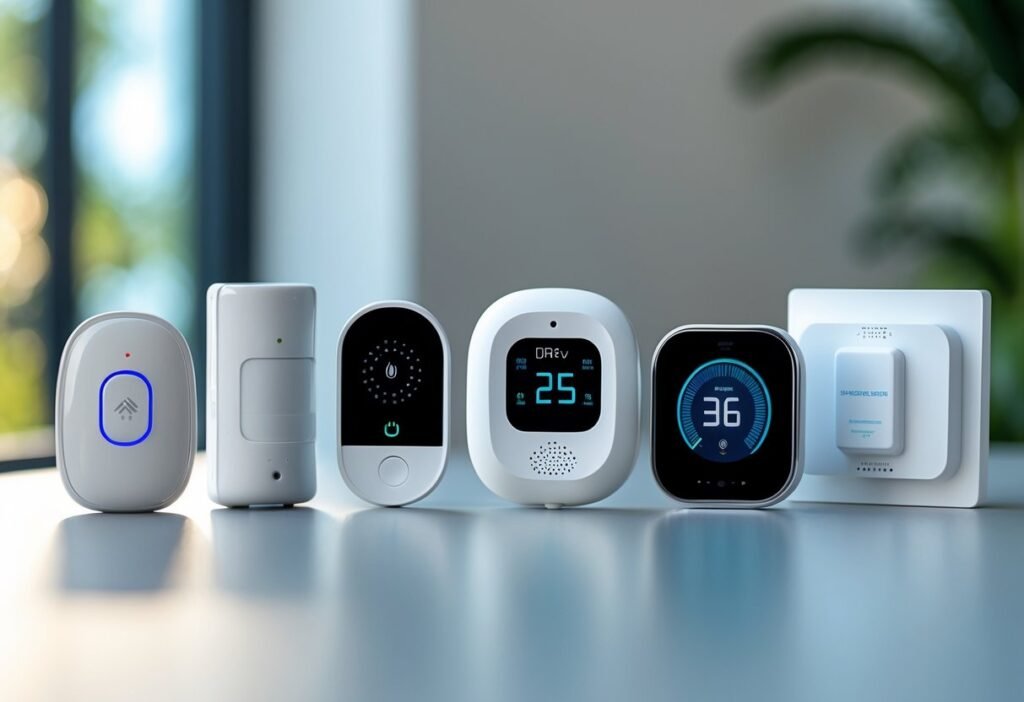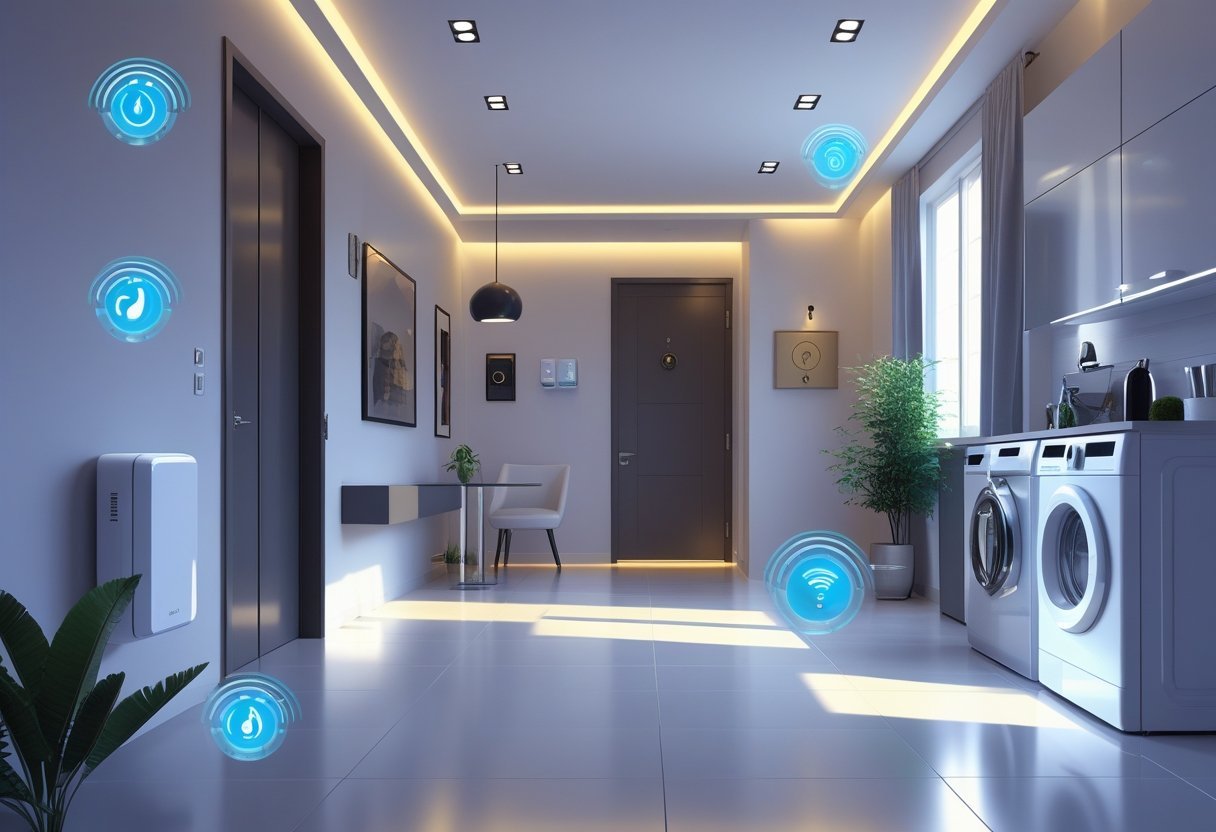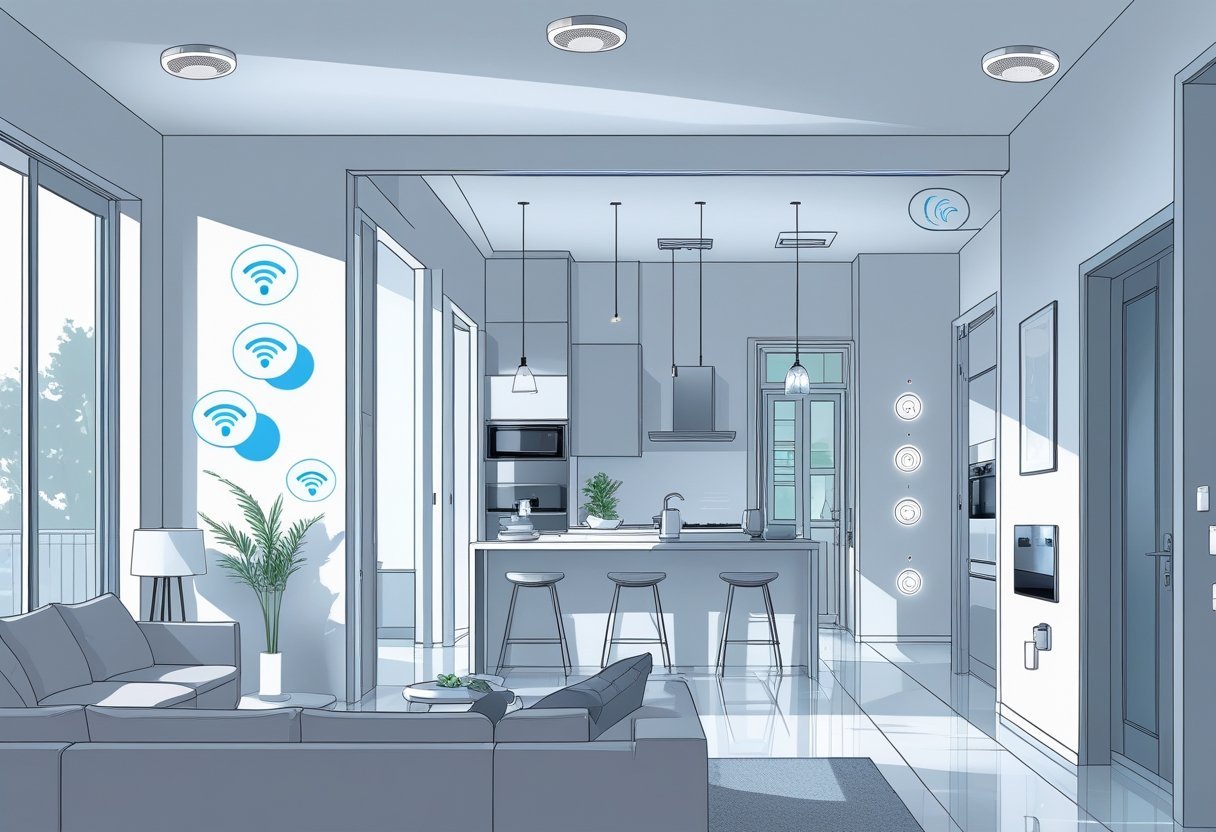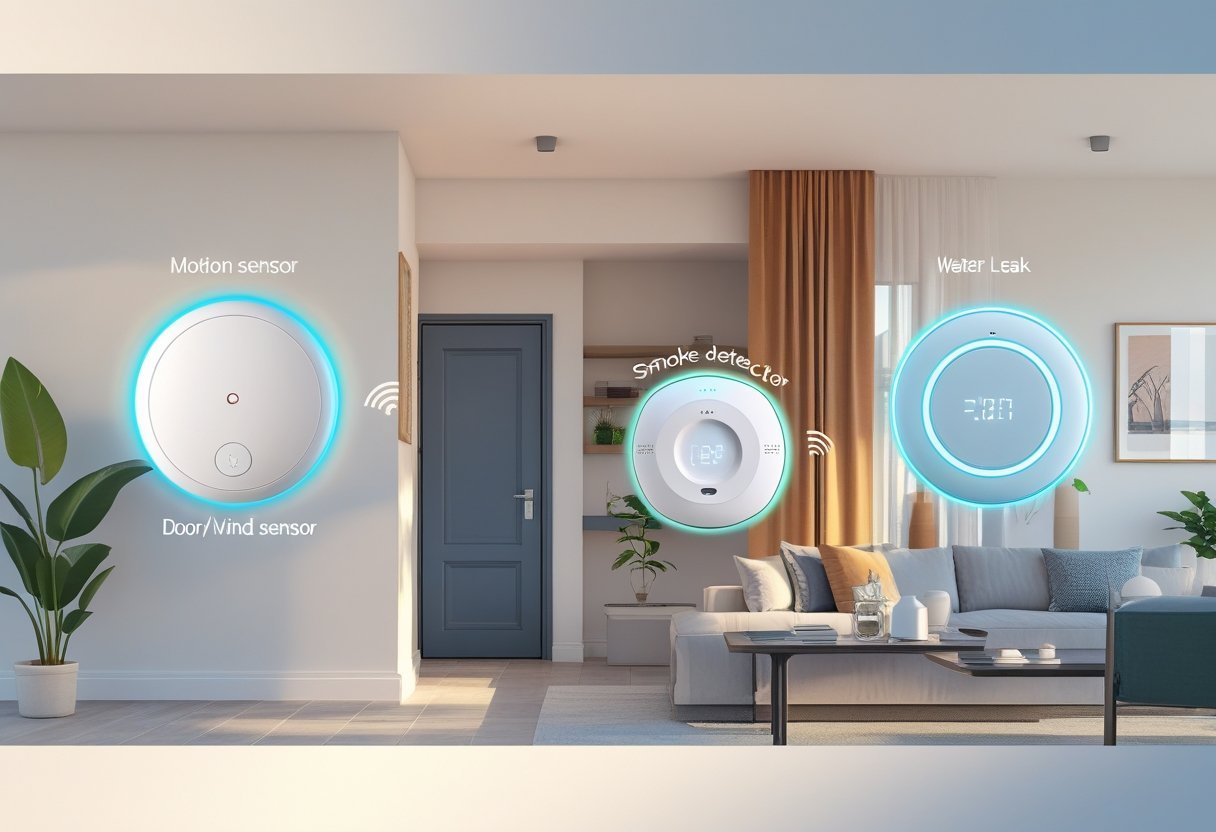As an Amazon Associate, we may earn a commission if you make a purchase — at no extra cost to you.
Essential Smart Home Sensors: Boost Safety and Convenience with Motion, Water Leak, and Automation Solutions
Smart home sensors are kind of the unsung heroes when it comes to making any house safer and, honestly, just more convenient. Motion sensors, door and window sensors, water leak detectors, smoke and carbon monoxide alarms, and those temperature or humidity sensors—they all help prevent accidents and alert you right away if something’s not right. Sure, these gadgets aren’t as flashy as a smart speaker or a camera, but they give you super quick warnings that can stop damage, theft, or safety issues before things get out of hand.
Table of Contents

With the right sensors, your home can send instant phone alerts, voice notifications, or even turn on lights and alarms exactly when you need it. A lot of the top-rated kits on Amazon hook up easily to smart hubs or voice assistants like Alexa. That means you can set up custom alerts or routines to boost both security and everyday comfort.
Key Takeaways
- Smart home sensors deliver real-time alerts for both safety and comfort.
- Picking the right sensor kits and connecting them to automation hubs just makes life simpler.
- People often ask which sensors are worth getting and how to use them with their voice assistants.
Key Essential Smart Home Sensors for Safety and Convenience

Smart home sensors really step up your protection and convenience game by watching for movement, keeping tabs on entry points, spotting leaks, and detecting harmful gases. These devices connect with hubs or voice assistants, so they can send out instant alerts or trigger routines—helping you react fast if something’s off or the environment suddenly changes.
Motion Sensors: Enhancing Security and Automation
Motion sensors use—you guessed it—motion detection to sense movement inside a room or even outside. They’re a staple in security systems, letting you know or sounding an alarm if there’s unexpected activity. They’re also great for flipping on lights automatically, which saves energy and makes moving around at night a lot safer.
Some motion sensors double as occupancy sensors, figuring out if someone’s actually in the room so your HVAC or lighting can adjust. You’ll find some stand-alone smart sensors, but a lot of multipurpose sensors come with extra perks like temperature or even sound detection.
- A great fit for 1-2 bedroom homes, this kit includes one base station, one keypad, four contact…
- Includes an intuitive Keypad that can arm and disarm your Alarm and Contact Sensors that detect when…
- Choose the Ring Alarm Kit that fits your needs and detect even more with additional Alarm Sensors…
Last update on 2026-02-11 / Affiliate links / Images from Amazon Product Advertising API
When you hook them up to a smart home hub, motion sensors can send real-time alerts to your phone. They can also kick off Alexa routines, which is super handy. Most of the big-name brands on Amazon make setup pretty painless and offer good compatibility with other smart stuff.
Door and Window Sensors: Safeguarding Entry Points
Door and window sensors (sometimes called contact sensors) are kind of a must-have for monitoring your home’s main entry and exit points. They work by detecting if a door or window opens or closes. If something opens unexpectedly, you’ll get an instant alert on your phone.
Contact sensors are usually a breeze to install, and you can buy them on their own or as part of bigger security systems. Some even include vibration or glass break sensors, which adds another layer of protection if someone’s trying to force their way in.
No products found.
Linking these sensors to voice assistants or security hubs can trigger alarms or turn on smart lights. Starter kits often come with a bunch of door/window sensors, so it’s pretty easy to cover all the weak spots in your house.
Water Leak Detectors: Preventing Costly Damage
Smart water leak detectors are designed to sense moisture in spots where leaks love to happen—think under sinks, near water heaters, or down in the basement. The moment they detect water, they’ll ping your phone, which can seriously cut down on water damage.
You can buy water leak sensors as standalone devices or as part of a smart home kit. They’re usually battery-powered and pretty simple to set up with an app.
No products found.
Many of these detectors have built-in alarms and can link up with your home automation system. For example, if a leak pops up in the laundry room, you could have a routine that sounds a siren or sends out a voice alert. These sensors are especially handy if you want to keep tabs on a vacation place or rental property when you’re not around.
Smoke and Carbon Monoxide Detectors: Life-Saving Alerts
Smoke detectors and carbon monoxide (CO) alarms are, honestly, non-negotiable for home safety. They’re on the lookout for dangerous levels of smoke, CO, and sometimes other gases—and they’ll send you a life-saving alert if there’s a problem.
Smart smoke and CO detectors can either join your home security system or work solo as smart sensors. Many support real-time alerts to your phone, even if you’re not home, which is a huge deal for fast emergency response and just general peace of mind.
No products found.
Some advanced detectors combine smoke, CO, and gas leak sensors in one. Most of the popular models also work with voice assistants, so you can get spoken warnings or trigger lights and alarms if something goes wrong. They’re built to meet strict safety standards, too, so you can actually trust them to do their job.
Choosing and Integrating Smart Sensors in Your Home

Picking out the right smart sensors really comes down to what fits your home’s layout and what you actually need. It’s also worth thinking about how these sensors will work with your existing smart home setup and any routines you already use.
Best Smart Sensor Kits and Popular Devices
Some of the top kits on Amazon are the Samsung SmartThings Starter Kit, Aqara Smart Home Starter Kit, and Ring Alarm Security Kit. These usually come with a mix of motion sensors, door/window sensors, and sometimes a water leak detector thrown in.
If you’re more into stand-alone sensors, things like the EcoBee SmartSensor, Wyze Contact Sensors, and Govee Water Leak Detectors get good reviews. People usually compare them based on battery life, real-time alerts, and how well the app works. It’s smart to check if the sensors use common protocols like Zigbee, Z-Wave, WiFi, or the new Matter protocol.
Amazon Alexa and Google Home support most major sensors, but it’s a good idea to double-check for certified compatibility so your voice commands don’t glitch out.
| Kit/Device | Sensors Included | Protocols Supported | Compatible With |
|---|---|---|---|
| Samsung SmartThings Kit | Motion/Door/Water | Zigbee, Z-Wave, WiFi | Alexa, Google Home |
| Aqara Starter Kit | Motion/Door/Temp/Humidity | Zigbee, Matter | Alexa, Google Home, Apple |
| Ring Alarm Kit | Motion/Door | Z-Wave, WiFi | Alexa |
No products found.
No products found.
Setup, Connectivity, and Voice Assistant Integration
Most smart sensors use WiFi, Zigbee, Z-Wave, or Bluetooth to connect. Some of the newer ones use the Matter protocol, which is supposed to make things easier if you’re mixing brands or hubs. If your house is big or has thick walls, you might need a range extender—Zigbee and Z-Wave don’t always reach as far as you’d like.
Setting them up usually goes something like this:
- Pair the sensor with your hub (like Samsung SmartThings) or connect it right to your phone app.
- Use the app to tweak alert settings—maybe set up instant push notifications for a leak.
- Link the sensor to Alexa or Google Home for voice alerts or routines, like turning on a light if there’s motion.
Battery life and reliability can really vary, so it’s smart to put sensors where the signal’s strong and you can reach them easily to swap out batteries.
Maximizing Benefits and Long-Term Value
You can save on energy bills by letting sensors automate your lights, thermostat, or HVAC. For example, motion sensors can turn off lights in empty rooms, while temperature and humidity sensors help your smart heating and cooling work more efficiently.
Remote monitoring means you can check your home’s status from anywhere. A lot of sensors will send you an alert the second a door opens or a leak starts, which is honestly pretty reassuring.
For the long haul, pick devices that support common standards like Matter or work with your whole smart home setup. That way, you’re less likely to run into compatibility headaches as you add new gadgets, and upgrades down the road will be a lot easier.
Frequently Asked Questions

Smart home sensors are a big help for warning you about intruders, leaks, or smoke. Look for brands you trust, easy integration with your voice assistant, and a privacy policy you’re actually comfortable with.
What are the most reliable smart sensors for home protection?
Some of the most reliable brands out there are Aqara, Samsung SmartThings, and Ring. A lot of people go for sensors with fast alerts and long battery life. Pay attention to wireless range and what other customers are saying, too.
How do smart sensors integrate with home automation systems?
Smart sensors connect to hubs like SmartThings, or sometimes straight to Alexa or Google Home. This means you can set up routines—like turning on a light if motion is detected. Most sensors use WiFi or Zigbee to talk to other devices.
Can smart home sensors help reduce insurance premiums?
Actually, yes—some insurance companies offer discounts if you’ve got smart smoke detectors or water leak sensors. It’s worth asking your insurer. They might want proof of installation or a monitored system before giving you a break.
What are the key considerations when choosing a smart water leak detector?
Look for a leak detector with instant alerts, a loud alarm, and a battery that lasts. Mobile app support and easy placement (like under sinks or near water heaters) are super useful. Some models come with extra probes for better coverage.
How do you set up Alexa routines with smart home sensors?
First, make sure your sensor is compatible with Alexa. Add it in the Alexa app, then create a new routine—like having a motion trigger turn on a light or send you a notification. The app will walk you through the steps, so it’s not too tricky.
What are the privacy implications of using smart home sensors?
Honestly, most sensors are constantly picking up info—stuff like your movements, routines, or even little changes in the environment. It’s a bit unsettling if you think about it. It’s worth taking the time to poke around in the privacy settings and actually see what’s getting shared with the company (or, who knows, some random third party). Not all brands are the same, either; I’d stick with ones that are upfront about their privacy policies. It’s not a perfect solution, but it does help lower the risk.
Related Posts:
DIY Home Security Systems: Top 5 Smart Alarm Kits Compared for Features and Subscription Options
Indoor & Outdoor Smart Cameras: 5 Best Security Cameras for Easy Home Monitoring
Top 10 Must-Have Smart Home Gadgets in 2025 for Beginners: Essential Devices and Easy Upgrades
Top 5 Smart Locks for a Keyless Home (2025 Review): Updated Guide for Secure, Convenient Entry

